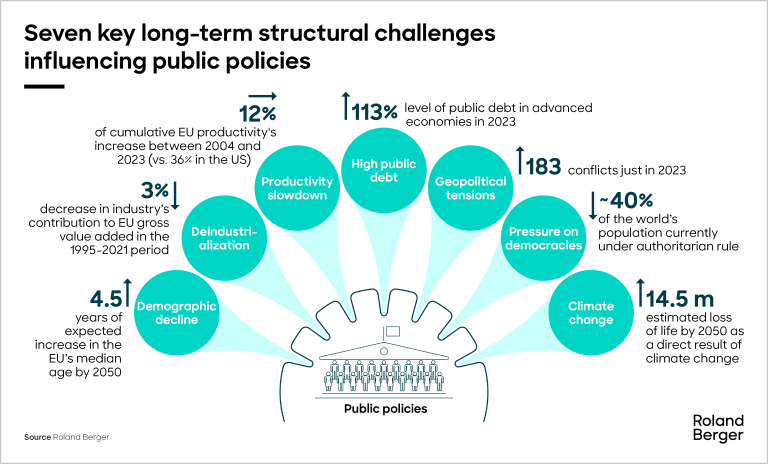Productivity growth in the Flemish private sector has halved from 4% per year in the period 2003-'07 to 2% per year in 2011-'08. What can policymakers, employers and other key stakeholders in the labor market do about this? In this study, the experts at Roland Berger share their insights into this problem.


Strengthening public policies' impact
How to establish long-term public policies that really work to tackle the structural challenges faced by our societies
The magnitude of today’s structural challenges requires a collaborative effort from both the public and private sectors, leveraging their unique assets to enhance economic, social, and environmental outcomes. Based on over 10 extensive discussions with Ministers and high-ranking civil servants, a comprehensive framework, illustrated by project case studies, has been developed to guide the establishment of effective long-term public policies in the current macro landscape.

"The rapid challenges faced by public stakeholders in recent years hinder reflection, yet the need for a clear strategic direction and a unifying narrative for society is more critical than ever."
This framework identifies five essential building blocks that enable the public sector to anticipate long-term challenges, implement plans beyond election cycles, and foster change while maintaining social cohesion.
Seven structural and interconnected disruptions that create major challenges
The need for long-term public policies that really work stems from seven key structural and interconnected disruptions that influence both our economies and the broader societal fabric and create major challenges to be tackled. What all of these challenges have in common is that they are anchored in a long-time horizon going beyond one election cycle and are transversal, touching on multiple policy domains simultaneously.
-
- Demographic decline - The demographic decline witnessed in most advanced economies shrinks the available workforce and thus decreases a country’s production capacity, while straining public finances as healthcare and pension spending increases
- Deindustrialization - Deindustrialization contributes to waves of short-term unemployment and limits opportunities for associated growth. It also reduces a country’s strategic autonomy as it becomes more reliant on the external procurement of essential goods
- Productivity slowdown - Lower productivity growth is bad for all citizens, as higher productivity growth allows for higher welfare
- High public debt - High levels of debt strain the public finances and limit fiscal space, whereas the economies are actually in need of more structural investments, face higher social spending and need sufficient budgetary buffer capacity for spending related to crisis management
- Geopolitical tensions – Escalation of global conflicts poses a significant threat to financial stability and global trade, which are crucial for economic prosperity. But more important, it is a humanitarian disaster, as millions of people are denied basic necessities like food and water and are subject to international migration
- Pressure on democracies – The growing dominance of authoritarianism disrupts democratic processes which are essential for the protection of basic human rights, for the free flow of ideas enabling innovation and for boosting economic development
- Climate change - The rise in temperature has exacerbated extreme weather events, threatening ecosystems and human populations, deepening inequalities, and causing significant displacement and migration
"In our rapidly changing society, it is paramount that we rethink how public policies are designed and implemented."
Five fundamental building blocks to enable the public sector to tackle long-term challenges
The common denominator of these challenges is that they will not be solved solely by market dynamics as they inherently require public-private sector collaboration and necessitate the public sector to adjust the way longterm public policies are typically designed and implemented.
Five key building blocks have been identified to help the public sector anticipate challenges, create effective plans beyond election cycles, and drive change while preserving social cohesion.
-
- Anticipate and align on long term challenges ahead - Addressing societal issues effectively requires the mobilization of independent experts across relevant domains, such as academics, former captains of industry or independent advisors, to offer unbiased perspectives on structural challenges. This involves a comprehensive analysis grounded on facts and figures aimed at uncovering root causes rather than merely addressing symptoms. Building broad consensus through multi-stakeholder consultations is essential and requires careful consideration and adequate time. By utilizing appropriate tools and methods, it is possible to forge a shared understanding and agreement on solutions
- Plan and act beyond election terms - Structural challenges like climate change and demographic shifts necessitate planning that extends beyond the typical electoral cycle to ensure continuity of efforts. This requires the establishment of consensus between representatives of companies and citizens, public administrations and political executive bodies to define long-term objectives. Legal frameworks play a crucial role in maintaining commitment across changing governments, with the Netherlands’ Delta Program serving as an exemplary model for such sustained engagement
- Take citizens on a shared journey - Fostering a narrative that promotes citizen engagement and ensures citizens feel compelled and empowered to contribute to a shared vision is vital. This can be achieved by leveraging digital platforms to crowdsource citizens’ opinions on important societal issues (incl. potential solutions), ensuring that citizens feel their contributions make a difference. Transparent communication and education about policy initiatives and legislative impacts are fundamental in maintaining public trust and involvement
- Foster collaboration between the public and the private sector - Complex societal challenges benefit greatly from robust public-private collaborations. Involving the private sector early in strategic discussions and policy formulation harnesses their expertise and promotes broader acceptance of policies. Moreover, dedicated governance and incentive mechanisms set-ups need to be developed to facilitate such complementarity of public and private initiatives. Instruments like Social Impact Bonds showcase successful financial collaborations that tackle societal challenges while providing returns to investors, demonstrating the potential of alliances between public and private sectors
- Take bold actions to kickstart structural changes - Achieving the desired transformation and initiating structural changes often necessitates decisive and significant actions, such as the formation of dedicated task forces with a strong mandate and capabilities to take bold actions within a limited timeframe while mobilizing different administrations and private initiatives. The US operation Warp Speed, for example, illustrates how rapid, effective public-private partnerships can be mobilized, not only for crisis management but also for long-term gains. Such initiatives exemplify the power of targeted, decisive actions in driving significant and lasting societal changes
"Now is the time for reforms. They will (and must) become the new normal for the public sector."
To effectively address long-term structural challenges, public sector decision-makers could utilize the framework introduced in this report to evaluate current actions against five fundamental building blocks essential for successful long-term public policies. This report thoroughly examines the five building blocks, provides a comprehensive analysis, strategic recommendations and best practices, supported by relevant case studies of Roland Berger projects and discussions with Ministers and top-ranking civil servants.
Roland Berger has supported a wide array of public sector actors in defining and implementing strategic policy initiatives that could be sources of inspiration to design your tailored approach. For more information, please do not hesitate to reach out to the authors of this publication.
We would like to thank Willem Vanlaer, Senior Project Manager at Roland Berger Brussels and core member of the Civil Economics team, for his significant contribution to this report.
Register now to access the report “Strengthening public policies' impact” and explore how to create effective long-term public policies addressing societal challenges. Furthermore, you get regular news and updates directly in your inbox.




_image_caption_none.png)






